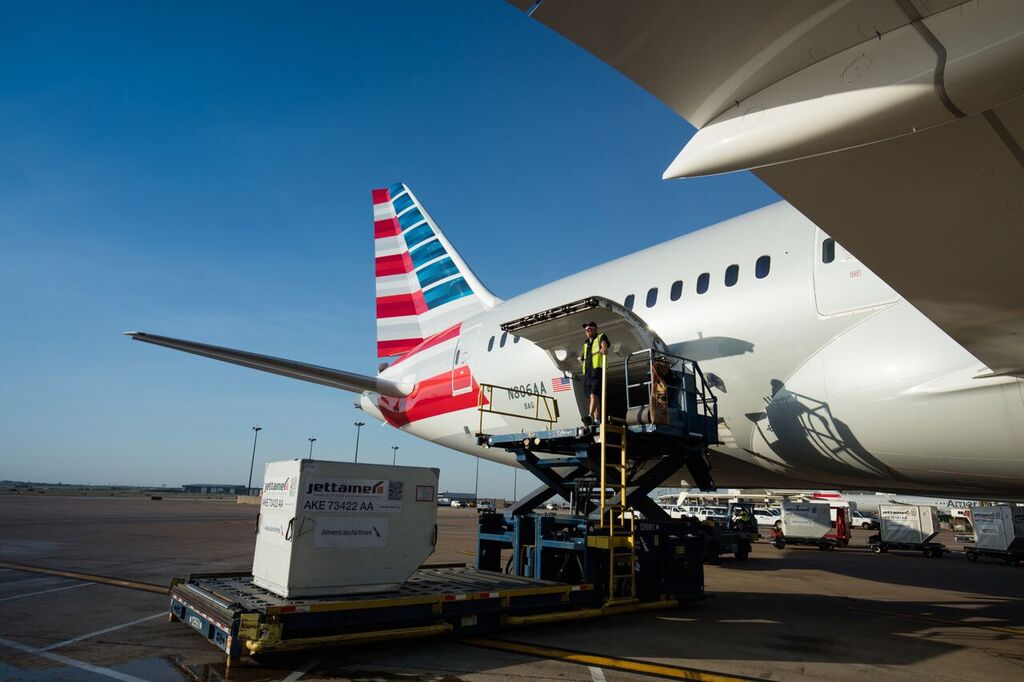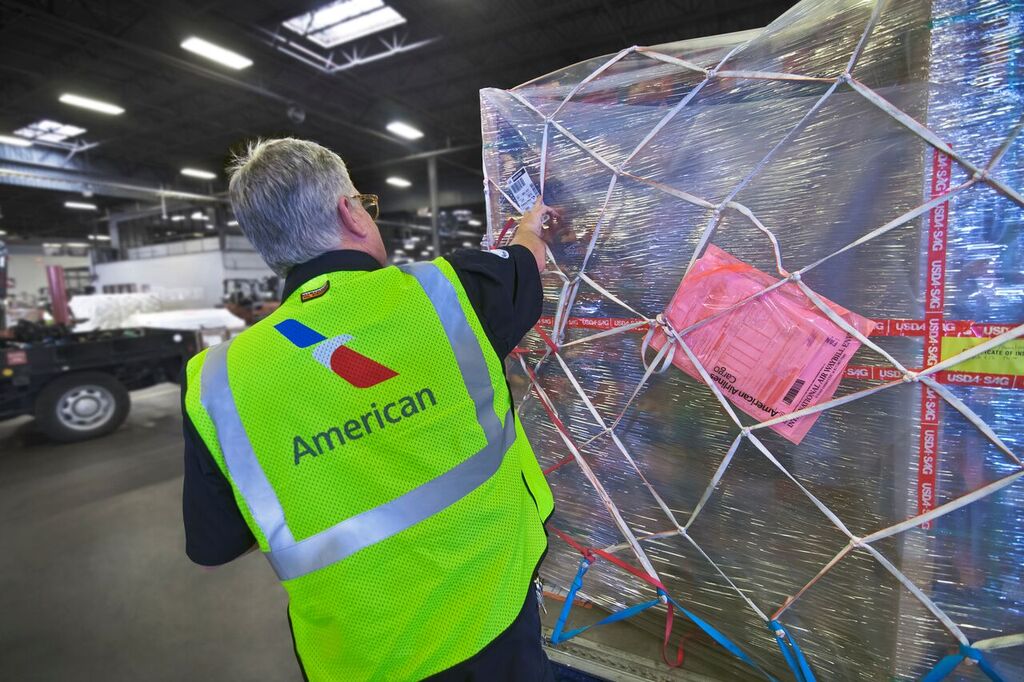American Airlines Cargo has hydrogen hopes
05 / 07 / 2023

Greg Schwendinger. Photo: American Airlines
American Airlines and its cargo division is placing its faith in hydrogen and Sustainable Aviation Fuel (SAF) technology development to reach zero-emission operations by 2050.
Hydrogen is a technology very much in the early stages of exploration within the aviation industry, but American Airlines and its cargo division are backing development of the future fuel.
The Fort Worth, Texas-headquartered airline has invested in two hydrogen development companies to diversify and increase its decarbonisation opportunities, says American Airlines Cargo president Greg Schwendinger.
In August last year, American made an investment in UK/US-based hydrogen-electric engine developer ZeroAvia.
A memorandum of understanding (MoU) signed at the same time also provides the airline with the opportunity to order up to 100 zero-emission engines, initially intended to power regional jet aircraft.
And in October last year, American made an equity investment in California-based Universal Hydrogen, which aims to realise hydrogen-powered commercial flights.
“We think that it’s going to take more than just SAF to get to zero emissions,” says Schwendinger.
“Making investments in alternatives to SAF is the way in which we’re trying to diversify our approach towards achieving our goal, which in 2050 is to be carbon neutral.
“With the two hydrogen startups, we’re making strategic investments to make funding available to those who we think have technologies that could be part of our solution.”
American Airlines does not have any freighters and has no plans to, confirms Schwendinger.
All its cargo is carried as belly freight, meaning any green investments on the passenger side of the business, will ultimately benefit the cargo division.
Commenting on whether American could become involved in future hydrogen aircraft testing, Schwendinger says: “Our current perspective is we’ve done our diligence to identify some of the startups that we think have good technology and sound plans in place.
“We are putting ourselves in a position not only to provide them with capital so they can continue to advance themselves but also for us to benefit from that technology if and when it comes to market.”

Photo: American Airlines Cargo
SAF strategy
SAF will still play a major part in American’s decarbonisation strategy though.
The airline currently has contracts in place to purchase SAF from three providers: Neste, Aemetis and Gevo.
American Airlines began working with Finnish renewable fuels and products company Neste in 2017 after striking an agreement to use Neste’s renewable fuels.
In August 2020, Neste agreed to supply American with SAF at San Francisco International Airport via pipeline.
Then in July 2022, Neste delivered a batch of its Neste MY Sustainable Aviation Fuel to American Airlines at San Francisco International Airport.
This was part of a pilot to certify SAF as a Carbon Offsetting and Reduction Scheme for International Aviation (CORSIA) eligible fuel that can be used by an airline to meet its emissions obligation under CORSIA.
Meanwhile, in December 2021, American announced it had agreed to take delivery of 16m gallons of SAF from California-based renewable fuels and biochemicals company Aemetis annually over a seven-year period beginning in 2024.
Then in July last year, the airline announced it would purchase 500m gallons of SAF over five years from Colorado-headquartered renewable chemicals and advanced biofuels company Gevo. Deliveries are expected to begin in 2026.
The airline said at the time of the deal its total low-carbon fuel commitments had reached more than 620m gallons — fulfilling approximately 20% of the airline’s goal to replace 10% of jet fuel usage with SAF by 2030.
Additionally, in March 2021, American Airlines reached an agreement in principle with freight forwarder Kuehne+Nagel to allocate a portion of the carbon reduction benefit it generates through its use of SAF to the logistics company.
Schwendinger agrees there is a question mark over whether the industry can feasibly increase production of SAF to make it financially viable by the net zero emissions target of 2050, but says: “From our perspective, SAF is an opportunity that we identified early on and one that we moved aggressively to get SAF in place from three great providers.”
2050 target
While future fuels make up a small percentage of the air cargo and passenger industry’s aviation fuel usage currently, SAF is expected to increasingly help American achieve its goal of net zero GHG emissions by 2050.
Guided by Jill Blickstein, vice president, sustainability at American Airlines, the airline aims to incrementally move towards the target.
In 2030, the airline hopes to replace about 10% of its jet fuel usage with SAF.
By 2035, it aims to lower its greenhouse gas emissions intensity by 45% and reduce its scope two emissions by 40%.
“We had subject matter experts review, verify and validate the steps that we intended to take,” says Schwendinger.

American Airlines is using BioNatur Plastics wrap. Photo: American Airlines
Green variety approach
In addition to investment in future fuels, American Airlines, part of the global airline alliance oneworld – which aims to become the first alliance of its kind to reach a target of carbon neutrality by 2050, is renewing its fleet, ground equipment, facilities and operations to be more sustainable.
American Airlines Cargo has cut its paper use by supporting the industry’s eAWB (electronic Air Waybill) initiative, and is using reusable, biodegradable polyethylene film for shipments at airports across the US as part of a partnership with M&G Packaging’s BioNatur Plastics, which started last year.
The product is durable but lighter than the plastic it replaces, which results in less fuel burn and reduced CO2 emissions, Schwendinger explains.
He points out that BioNatur is fully recyclable, but if it is put into landfill it will decompose in five to 10 years under normal conditions, rather than 1000 years for traditional plastic.
“Last year we replaced about 130,000 pounds of what would have otherwise been traditional plastics with this product,” Schwendinger says.
“And the easiest way in which BioNatur helps us to put that into context is 130,000 pounds is the equivalent of 6.4m plastic water bottles.
“They’re a great partner in terms of customising the solution to meet our specifications from a dimensioning requirement perspective.”
He says American Airlines Cargo is now looking for other ways in which it can utilise BioNatur’s technology.
However, while efforts to increase air cargo sustainability are ramping up, the industry is going to need to shoulder the cost of decarbonisation to achieve it by 2050, believes Schwendinger.
“If everyone has the same commitment that American does, then I think that there’s no reason that the industry can’t get to net zero.
“That’s going to take a lot of hard work and a lot of investment. I think that you’re going to need to see people starting to be willing to pay for the incremental costs that some of these alternatives may introduce.”
However, he adds: “But that allows us to provide more capital into the infrastructure that is required to deliver the technologies and solutions which ultimately brings the cost down.”














